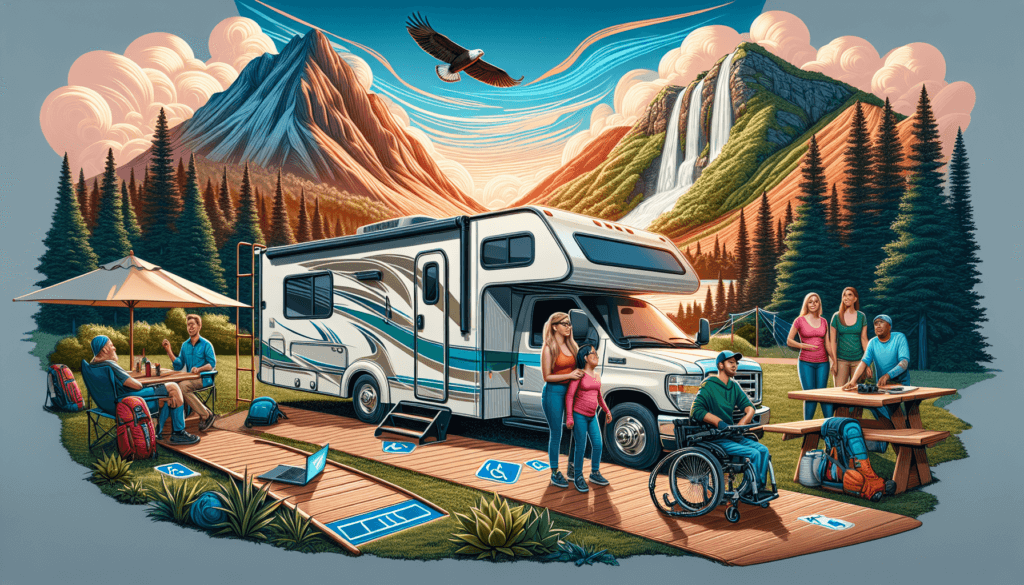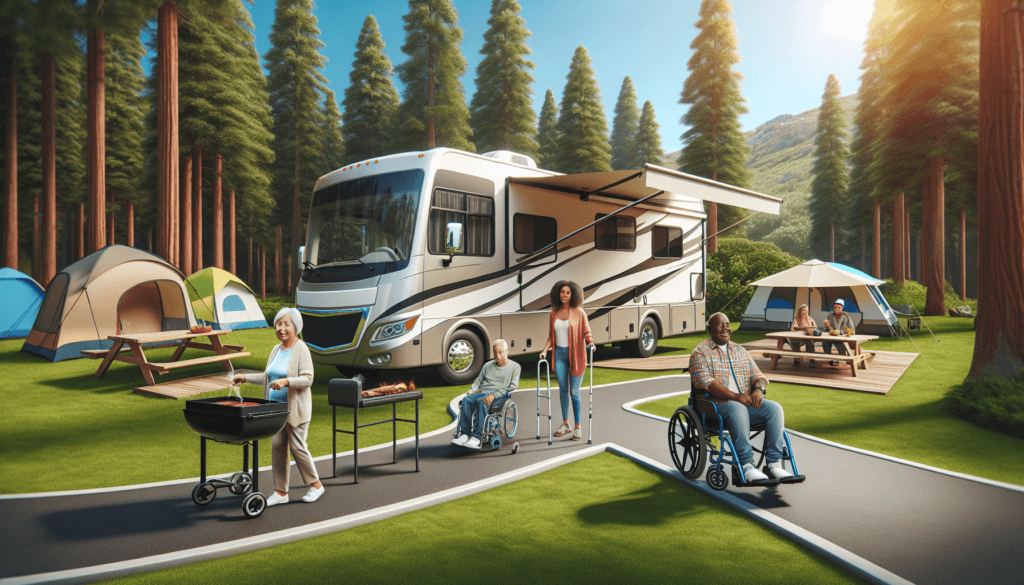RV Camping with Disabilities: Tips for Accessible Travel is an informative article that offers valuable advice and practical tips for individuals with disabilities who are interested in embarking on an RV adventure. Whether you have a physical impairment or are traveling with a friend or family member who does, this guide will provide you with essential strategies to ensure a comfortable and enjoyable experience on the road. From choosing the right RV to accessibility modifications and planning accessible routes, this article covers everything you need to know to make your dream of RV camping a reality.

Planning Your Trip
Planning a trip can be an exciting adventure, especially when you have a disability. By taking the time to plan and prepare, you can ensure that your RV camping experience is enjoyable and accessible. Here are some important factors to consider when planning your trip.
Choosing an RV
The first step in planning your accessible RV camping trip is selecting the right RV. There are various types of RVs available, including motorhomes, travel trailers, and camper vans. It’s essential to choose an RV that meets your accessibility needs.
Consider the size and layout of the RV. Look for features such as wide doorways, spacious interiors, and wheelchair-friendly design. Some RVs also come equipped with ramps or lifts for easy access. Take the time to test out different models and find one that suits your specific requirements.
Selecting Accessible Campgrounds
Once you have chosen your RV, it’s vital to research and select accessible campgrounds. Not all campgrounds are equal in terms of accessibility, so it’s essential to find ones that meet your specific needs.
Look for campgrounds that offer amenities such as accessible restrooms and showers, paved pathways, and level campsites. Some campgrounds also provide accessible facilities for fishing, hiking, and other activities. Make sure to contact the campgrounds in advance and inquire about their accessibility features to ensure a comfortable stay.
Researching Accessibility Features
Before your trip, take the time to research the accessibility features and resources available at your destination. Look for accessible attractions, parks, restaurants, and other amenities that you may want to visit. Remember to check if they have accessible parking, entrances, and restrooms to accommodate your needs.
Additionally, research any specific accessibility regulations or requirements in the areas you plan to visit. For example, some parks may require advance reservations for accessible campsites or have different rules for service animals. Being aware of these details in advance will make your trip planning smoother and more enjoyable.
Creating an Itinerary
To make the most of your RV camping trip, it’s a good idea to create an itinerary. Plan out the places you want to visit, the activities you want to do, and the duration of your stay at each location. Having a well-organized itinerary will help you stay on track and ensure that you have enough time to enjoy all the accessible attractions and activities.
Research the accessibility of each location on your itinerary and determine if any additional accommodations or preparations are needed. It’s also essential to factor in rest and relaxation time to avoid overexertion during your trip. By planning your itinerary ahead of time, you can have a stress-free and fulfilling RV camping experience.
RV Modifications
To make your RV truly accessible, you may need to consider some modifications. These modifications can enhance your comfort and mobility within the RV and make it easier for you to enjoy your travel experience. Here are some common RV modifications for accessibility.
Wheelchair Lifts and Ramps
If you use a wheelchair, installing a wheelchair lift or ramp in your RV can provide easy access to the living area. These lifts and ramps are designed to safely lift you or your mobility device into the RV, eliminating the need for assistance or awkward transfers. Be sure to consult with a professional to ensure proper installation and compatibility with your RV model.
Accessible Bathroom and Shower
Making your RV bathroom and shower accessible is crucial for a comfortable trip. Consider installing grab bars, adjustable showerheads, and shower benches to accommodate your needs. You may also need to modify the height of sinks and install handrails to ensure safety and convenience. These modifications will allow you to maintain your independence while on the road.
Bedroom Accessibility
Having an accessible bedroom in your RV is essential for a good night’s sleep. Consider lowering the bed height to make it easier to transfer in and out. Install grab bars or handrails near the bed to provide stability and support. Consider investing in an adjustable bed for added comfort and convenience. These modifications will create a safe and accessible sleeping environment during your RV camping adventure.
Lowered Countertops and Cabinets
To make the kitchen area more accessible, consider lowering countertops and cabinets. This adjustment will allow you to reach and use the kitchen amenities comfortably. Adding pull-out shelves and organizing storage areas can also make it easier to locate and access items. With these modifications, you can prepare meals and enjoy cooking in your RV with ease.
Wide Doorways and Hallways
Ensure that the doorways and hallways in your RV are wide enough to accommodate your mobility device comfortably. If needed, consider widening the doorways to allow for smooth passage. Additionally, remove any unnecessary obstructions or furniture to create a more open and accessible living space. With wide doorways and hallways, you can move around your RV safely and conveniently.

Packing Essentials
When it comes to packing for your accessible RV camping trip, it’s essential to consider your specific needs and requirements. Here are some key items to include in your packing list.
Medical Supplies
If you require specific medications or medical equipment, make sure to pack an ample supply for your trip. Consider carrying extra prescriptions or medical paperwork in case of emergencies. It’s also a good idea to have a first aid kit with essential supplies such as bandages, pain relievers, and any other necessary medical items.
Mobility Aids
Don’t forget to pack your mobility aids, such as wheelchairs, walkers, or canes. Ensure you have all the necessary attachments and accessories to keep them functioning properly. If you use a power wheelchair or scooter, remember to bring spare batteries and charging equipment. Having your mobility aids readily available will ensure you can navigate the campsite and participate in activities with ease.
Accessible Kitchen Tools
If you plan on cooking in your RV, bring along accessible kitchen tools that cater to your needs. These may include adapted utensils, grippers, or specialized cutting tools. Additionally, consider packing silicone grip mats or stabilizers to secure items on countertops or tables. Having accessible kitchen tools will make meal preparation more convenient and enjoyable.
Bedding and Comfort Items
Ensure you have comfortable bedding to ensure a good night’s sleep during your RV camping adventure. Pack pillows, blankets, and sheets that meet your comfort preferences. If needed, consider bringing additional comfort items such as mattress toppers or heated blankets. Having the right bedding and comfort items will enhance your overall camping experience.
Safety Considerations
Safety should always be a top priority during your RV camping trip. It’s important to be prepared for emergencies and to take necessary precautions to ensure your well-being. Here are some safety considerations to keep in mind.
Emergency Preparedness
Before hitting the road, create an emergency plan and ensure everyone in your travel party is aware of it. This plan should include contact information for emergency services, family, and friends. Familiarize yourself with the locations of nearby hospitals, urgent care centers, or medical facilities along your route. It’s also important to pack an emergency kit with essential supplies such as flashlights, batteries, a first aid kit, and emergency food and water.
Accessible Exits
Familiarize yourself with the exits in your RV to ensure a quick and safe exit in case of emergencies. Test the accessibility of each exit and make adjustments if necessary. Ensure that doorways are wide enough and that any ramps or lifts are fully functional. Regularly inspect and maintain these exits to ensure they are always accessible when needed.
Medical Alert Systems
Consider investing in a medical alert system to provide an extra layer of safety during your RV camping trip. These systems often come in the form of wearable devices or smartphone apps and provide a quick and easy way to seek help in case of emergencies. Make sure to research and choose a system that best suits your needs and preferences. Having a medical alert system can provide peace of mind and swift assistance when needed.

Navigating the Campsite
Once you arrive at your chosen campground, navigating the campsite will be a crucial aspect of your accessible RV camping experience. Here are some tips to help you navigate the campsite with ease.
Choosing an Accessible Campsite
When booking your campsite, make sure to request an accessible campsite in advance. These campsites are designed to cater to individuals with disabilities and offer amenities such as wider parking spaces, level ground, and accessible restrooms. Consider the proximity of the campsite to amenities such as water and electric hookups, dump stations, and activity areas, to ensure maximum comfort and convenience during your stay.
Setting up Ramp and Outdoor Area
Once you have parked your RV, creating an accessible outdoor area will enhance your camping experience. Set up a ramp or lift if needed, making sure it is securely in place. This will provide easy access in and out of the RV for yourself and others. Arrange outdoor furniture and equipment in a way that allows for easy maneuvering and accessibility. Your outdoor area should be a comfortable and inviting space for relaxation and recreation.
Managing Terrain Challenges
Some campgrounds may have uneven terrain or challenging pathways. To navigate such terrain with ease, consider using portable ramps or leveling blocks to create a stable surface. These tools can help you avoid potential trip hazards and make it easier to move around the campsite. It’s also essential to be mindful of any potential obstacles, such as roots or rocks, and plan your route accordingly. By being prepared and adaptable, you can overcome terrain challenges and enjoy your surroundings.
Transportation Options
While your RV provides comfortable accommodations, you may need additional transportation options to explore your destination. Here are some transportation options to consider.
Accessible Vehicles or Scooters
If you plan to explore attractions or destinations outside of your RV campground, renting an accessible vehicle or mobility scooter can be a convenient option. Many rental companies offer accessible vehicles equipped with ramps or lifts, allowing you to travel independently. Alternatively, you can rent a mobility scooter to enhance your mobility and accessibility while exploring your destination. Research local rental options in advance to ensure availability during your trip.
Public Transportation Services
If you prefer not to rent a vehicle, researching public transportation services in your destination can provide alternative transportation options. Many cities offer accessible buses or trains equipped with ramps or lifts. Research the accessibility features and schedules of these services to determine their suitability for your travel needs. Public transportation can be a cost-effective and convenient way to explore your surroundings without the need for a personal vehicle.

Activities and Recreation
One of the joys of RV camping is the abundance of outdoor activities and recreational opportunities. Here are some accessible activities to consider during your trip.
Accessible Hiking and Nature Trails
Many national and state parks offer accessible hiking and nature trails designed to accommodate individuals with disabilities. These trails often provide smooth surfaces, gentle slopes, and accessible rest areas. Research the accessibility of hiking and nature trails in your chosen destination and plan your excursions accordingly. Enjoy the scenic beauty and tranquility of nature while staying safe and comfortable on accessible trails.
Water Activities and Fishing
If you enjoy water activities or fishing, look for accessible areas that cater to your interests. Many campgrounds have lakes, rivers, or coastline that offer accessible fishing piers, boat ramps, or kayak launching points. Check local regulations and obtain any necessary fishing permits. Enjoy the serenity of the water while engaging in your favorite activities in an accessible and inclusive environment.
Picnicking and BBQs
Take advantage of the outdoor space near your RV to enjoy picnics or BBQs. Set up a picnic table with ample space for wheelchair users to join comfortably. Consider using portable grills or BBQ equipment that can be adjusted to the appropriate height. Pack your favorite picnic blanket or outdoor chairs to create a cozy and accessible dining experience. Enjoy delicious meals and create lasting memories surrounded by nature.
Group Activities and Events
Many campgrounds offer group activities or events for campers to socialize and engage in recreational activities. Look for accessible group activities such as nature walks, craft sessions, or group campfires. Participating in these activities can be an excellent opportunity to meet other campers and create connections. By engaging in group activities, you can enhance your sense of community and make your RV camping experience even more enjoyable.
Accessible Sports and Games
Engage in accessible sports and games during your RV camping trip. Look for campgrounds that have accessible facilities for activities such as wheelchair basketball, bocce ball, or wheelchair tennis. Some campgrounds may have adaptive equipment available for use or organized tournaments for individuals with disabilities. Enjoy friendly competition and stay active during your RV adventure.
Connecting with Others
While RV camping can be a solitary experience, connecting with others can enhance your journey and provide valuable support. Here are some ways to connect with others during your accessible RV camping trip.
Joining Support Groups
Consider joining support groups or organizations dedicated to accessible RV camping or outdoor activities. These groups often provide valuable resources, tips, and a supportive community of individuals with similar interests and experiences. Attend camping rallies or meetups organized by these groups to connect with other travelers and share insights. Joining support groups will allow you to learn from others’ experiences and build lasting friendships.
Online Resources and Communities
The internet is a valuable resource for connecting with others and accessing information about accessible RV camping. Explore online forums, blogs, and social media groups dedicated to accessible travel. Engage with fellow travelers, ask questions, and share your own experiences. Online communities can provide valuable advice, recommendations, and inspiration for your RV camping adventures. Connect with like-minded individuals, build a network, and embark on new adventures together.

Accessible Travel Apps and Tools
Take advantage of modern technology to enhance your accessible RV camping experience. Here are some useful travel apps and tools to consider.
Finding Accessible Restaurants and Amenities
Use travel apps and websites that offer information on accessible restaurants and amenities. These resources often provide reviews, ratings, and detailed accessibility features of various establishments. Researching accessible restaurants in your destination will ensure you have dining options that meet your needs and preferences. Additionally, consider using smartphone apps that allow users to report on accessibility features in real-time. By using these tools, you can easily find accessible dining options along your route.
Accessible Navigation and Maps
Many smartphone apps and GPS devices offer accessible navigation and maps specifically tailored for individuals with disabilities. These tools provide information on accessible pathways, locations of ramps or lifts, and points of interest. Consider using a navigation app that includes voice guidance and step-by-step directions to make navigation easier and more convenient. By utilizing these tools, you can confidently explore your surroundings while staying on accessible routes.
Hotel and Campground Booking Tools
When booking accommodations for your RV camping trip, use hotel and campground booking tools that provide information on accessibility features. These tools often allow you to filter search results based on various accessibility criteria, such as accessible parking, ramps, or accessible restrooms. Reviewing these details during the booking process will ensure a comfortable stay that meets your accessibility requirements. Take advantage of these tools to find the ideal campgrounds and accommodations for your accessible RV camping trip.
Conclusion
RV camping with disabilities can offer incredible opportunities for exploration, connection, and enjoyment of the great outdoors. By planning your trip, making necessary modifications, packing essentials, and considering safety measures, you can ensure a smooth and accessible adventure. Navigating the campground, choosing transportation options, engaging in accessible activities, and connecting with others will further enhance your experience. Utilizing accessible travel apps and tools will provide invaluable information and assistance along the way. With careful planning and preparation, your accessible RV camping trip can be a memorable and fulfilling journey.
Remember, the most important thing is to relax, have fun, and enjoy the experiences that RV camping with disabilities can bring. Happy travels!


